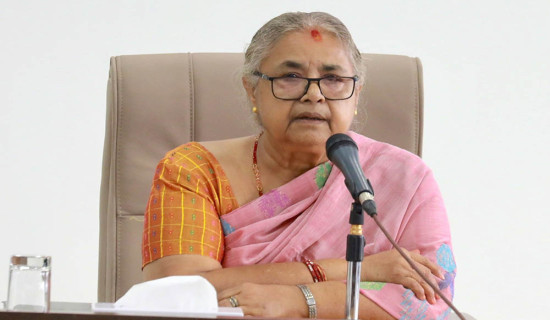Data released by the Chinese Ministry of Civil Affairs earlier this month shows that fewer people in China are getting married amid the rising unemployment rate in the country.
According to some China watchers, the trend is being driven by the high cost of marriage and overwhelming economic pressures on the Chinese youth.
As per reports, in the first quarter of 2024, marriage registrations in China totalled 1.969 million couples, down from 2.147 million couples in the same period of 2023, reflecting a decline of 178,000 couples, or an 8.3 percent drop.
The Voice of America (VOA) reported, quoting the Chinese Ministry of Civil Affairs’ data, that more than half of Chinese between the ages of 25 and 29 remained unmarried last year.
The situation has reportedly created a challenge for China, the world’s second-largest economy, to maintain its workforce.
According to experts, with unemployment rates so high and job opportunities scarce in China, especially in the country’s small and medium-sized cities and rural areas, none can afford to marry without a stable income.
Since the marriage registration peak of 13.27 million couples in 2013, the country of 1.4 billion experienced nearly a decade of steadily declining marriage registrations until 2023, when there was a 12.4 percent jump in the number of new marriages compared with the prior year, as reported by Epoch Times.
According to a US publication, the number of marriages was 7.68 million couples in 2023, up 847,000 couples from 6.833 million in 2022, while divorce registrations also increased by 493,000 couples, from 2.1 million in 2022 to 2.59 million in 2023.
Experts said decreasing marriage rate in China raises concern over fewer childbirths amid rising retiree or ageing population.
According to American think tank Council on Foreign Relations (CFR), the uptick in marriage rate in China was a temporary blip rather than a long-term change from the Asian major’s steady transition to a rapidly aging society marked by falling marriage rates, ultra-low fertility, and a declining number of youth.
The Communist regime in China, in late 2022, abruptly lifted its tough Covid-zero policies.
Such Covid-zero policies, marked by tough mobility restrictions, tight controls on gatherings, and increasing reliance on large city-wide lockdowns in the face of ever more transmissible virus variants, not only took a significant toll on economic activity but also led many couples to postpone wedding plans—contributing to a nearly 11 percent drop in marriages between 2021 and 2022, as reported by CFR.
Lifting of those strict policies triggered a rebound in both the economy and society from the artificially low pandemic levels, according to CFR.
As per CFR, with extra-marital births highly uncommon in East Asia, falling marriage rates are themselves a leading indicator of declining fertility rates.
In all likelihood, China—where the number of marriages registered each year has declined roughly 50 percent since the peak reached in 2013—will steadily follow in the footsteps of its East Asian neighbours towards a rapidly aging society marked by falling marriage rates, ultra-low fertility, and a declining number of youth, as reported by the New York-based think tank.
The Epoch Times reported, quoting Ji Feng, a prominent figure in the 1989 student movement and an artist, that the Chinese youth have less appetite for marriage than in the past.
“Many people I know, including college graduates and some postgraduates, are currently unemployed and staying at home. Especially among those whose parents hold government positions, quite a few are in this situation,” Ji Feng, a leader of the Guizhou University Students’ Autonomous Federation during the 1989 student protest, told the publication.
Moreover, the burden of pension is also piling up, and major state pension funds are also expected to run out of money by 2035 due to the rapidly growing number of retirees (ageing population), as per reports.
“The economic downturn has left many struggling to afford even basic meals, shifting priorities towards survival above all else. For most, marriage has taken a back seat. The primary focus is now on securing a livelihood, finding employment, and pursuing meaningful work. Survival has become the utmost priority,” Ji Feng was quoted as saying.
According to experts, with unemployment rates so high and job opportunities scarce in China, especially in the country’s small and medium-sized cities and rural areas, none can afford to marry without a stable income.
Epoch Times reported, citing a research report by Chinese scholar Zhang Dandan, an associate professor at Peking University, that the actual youth unemployment rate in China in March last year could be as high as 46.5 percent.
According to a report by India-based monthly magazine Swarajya, senior economist at Natixis Corporate and Investment Bank, Gary Ng, has called the gradual decline “unavoidable” as the attitude of China’s young population towards marriage has changed.
“The general consensus among economists is that if the age imbalance goes haywire, that’s something you worry about,” Asian studies professor James Chin was quoted as saying by Swarajya.
Furthermore, costs linked to raising children are creating further reluctance to marriage in China, and simultaneously, divorce rates have also increased in the country, according to South China Morning Post.
Moreover, the burden of pension is also piling up, and major state pension funds are also expected to run out of money by 2035 due to the rapidly growing number of retirees (ageing population), as per reports.












